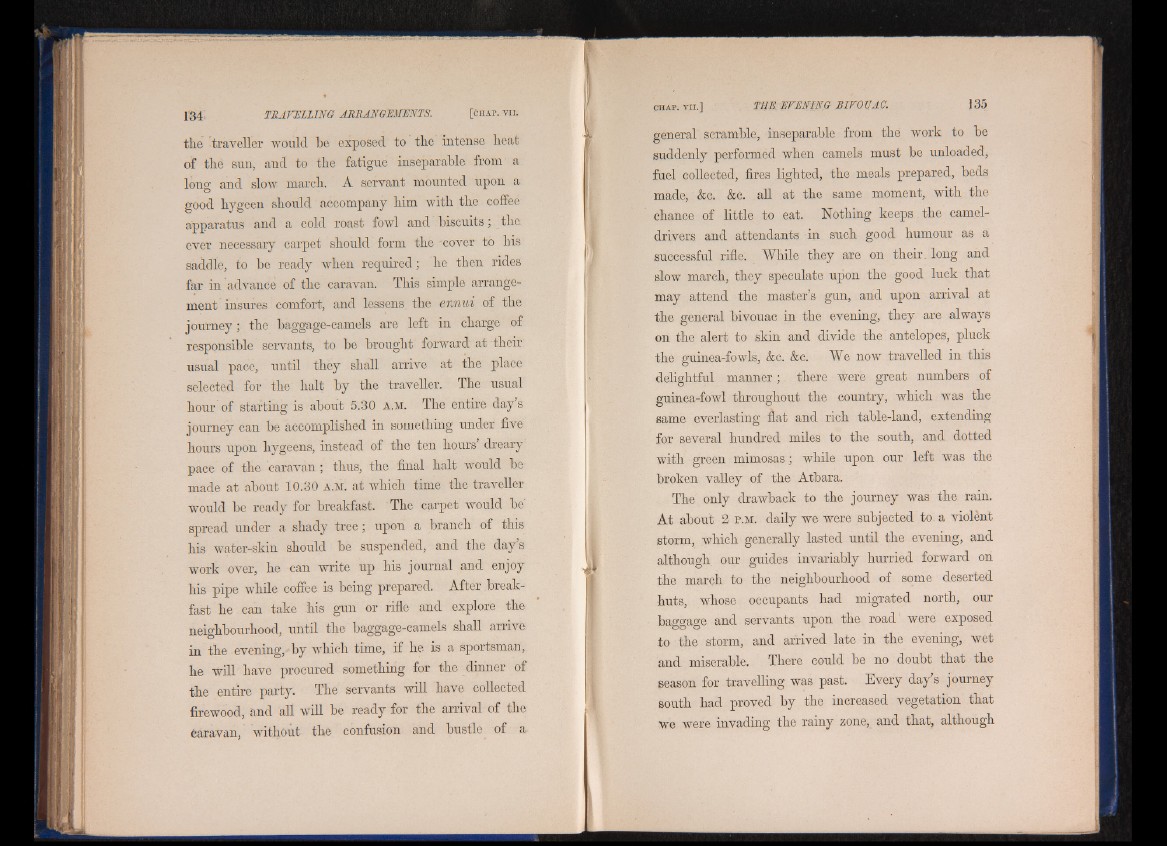
the traveller would be exposed to the intense heat
of the sun, and to the fatigue inseparable from a
long and slow march. A servant mounted upon a
good hygeen should accompany him with the coffee
apparatus and a cold roast fowl and biscuits; the
ever necessary carpet should form the 'cover to his
saddle, to be ready when required; he then rides
far in advance of the caravan. This simple arrangem
en t insures comfort, and lessens the ennui of the
journey; the baggage-camels are left in charge of
responsible servants, to be brought forward at their
usual pace, until they shall arrive at the place
selected for the halt by the traveller. The usual
hour of starting is about 5.30 A.M. The entire day s
journey can be accomplished in something under five
hours upon hygeens, instead of the ten hours dreary
pace of the caravan ; thus, the final halt would be
made at about 10.30 a .m . at which time the traveller
would be ready for breakfast. The carpet would be'
spread under a shady tree; upon a branch of this
his water-skin should be suspended, and the day’s
work over, he can write up his journal and enjoy
his pipe while coffee is being prepared. After breakfast
he can take his gun or rifle and explore the
neighbourhood, until the baggage-camels shall arrive
in the evening, by which tune, if he is a sportsman,
he will have procured something for the dinner of
the entire party. The servants will have collected
firewood, and all will be ready for the arrival of the
caravan, without the confusion and bustle of a
general scramble, inseparable from the work to be
suddenly performed when camels must be unloaded,
fuel collected, fires lighted, the meals prepared, beds
made, &c. &c. all at the same moment, with the
chance of little to eat. Nothing keeps the camel-
drivers and attendants in such good humour as a
successful rifle. While they are on their, long and
slow march, they speculate upon the good luck that
may attend the master’s gun, and upon arrival at
the general bivouac in the evening, they are always
on the alert to skin and divide the antelopes, pluck
the guinea-fowls, &c. &c. We now travelled in this
delightful manner; there were great numbers of
guinea-fowl throughout the country, which was the
same everlasting flat and rich table-land, extending
for several hundred miles to the south, and dotted
with green mimosas; while upon our left was the
broken valley of the Atbara.
The only drawback to the journey was the rain.
At about 2 p .m . daily we were subjected to a violent
storm, which generally lasted until the evening, and
although our guides invariably hurried forward on
the march to the neighbourhood of some deserted
huts, whose occupants had migrated north, our
bavo'ao'e and servants upon the road' were exposed O O O x .to the storm, and arrived late in the evening, wet
and miserable. There could be no doubt that the
season for travelling was past. Every day’s journey
south had proved by the increased vegetation that
we were invading the rainy zone, and that, although